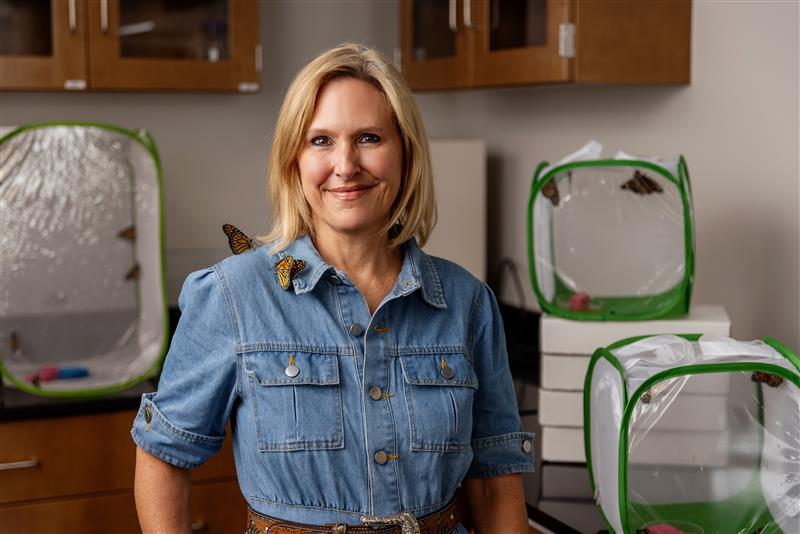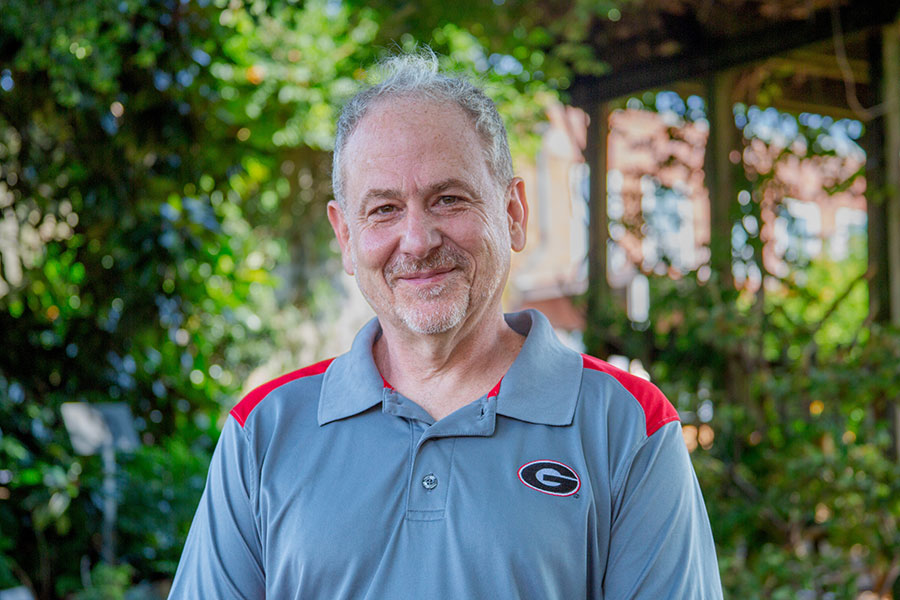
An innovator in peanut breeding whose research revitalized an industry and an ardent champion of agricultural education were inducted into the Georgia Agricultural Hall of Fame at the 68th University of Georgia College of Agricultural and Environmental Sciences (CAES) Alumni Association Awards in Athens.
The 2024 honorees are William D. Branch, Georgia Seed Development Professor in Peanut Breeding and Genetics in the Department of Crop and Soil Sciences, and Elzie Argene Claxton, an agriculture educator and 1980 CAES agricultural education graduate who went on to earn a master’s degree and education specialist degree from UGA’s College of Education. The inductees were honored at the 68th annual CAES Alumni Association Awards banquet on April 6 at The Classic Center.
Established in 1972, the Georgia Agricultural Hall of Fame honors individuals making extraordinary contributions to agriculture and agribusiness industries in the state.
Inductees are nominated by members of the public and selected by the awards committee of the CAES Alumni Association. Those nominated must be of impeccable character, have outstanding leadership skills, made noteworthy contributions to Georgia’s agricultural landscape and been recognized for achievements in agriculture and other areas.
William D. Branch
William D. Branch became interested in plant breeding while growing up on a farm in south central Oklahoma where his family grew wheat and a few acres of peanuts. Following high school, he continued his education in agronomy at Oklahoma State University, earning his bachelor’s and master’s degrees and his doctorate before taking a postdoctoral position at Auburn University. In 1978, Branch moved to Tifton, Georgia, to begin working with theUGA peanut breeding program at the Coastal Plain Experiment Station.
Branch’s work improving peanut cultivars has improved the profitability of peanut farming in Georgia, the Southeast and the world at large. Georgia farmers plant more than 675,000 acres of peanuts each year, amounting to a $1.8 billion industry.
The success of peanut production in Georgia has been a team effort by UGA scientists to improve peanut genetics, cultural practices, irrigation technology and chemical control of biotic factors. Peanut cultivars developed by Branch account for more than 80% of the peanut acreage grown in Georgia and the Southeast. Branch has released 31 elite peanut cultivars and five improved germplasm lines and populations for use by fellow plant breeders. Two cultivars, ‘Georgia Green’ and ‘Georgia O6G’, have been credited with saving the Southeastern U.S. peanut industry due to their resistance to tomato spotted wilt virus. In addition to disease resistance, the cultivars are designed to have higher yields and improved shelling efficiency to increase profitability without increasing input costs.
Between the release of Georgia runner and the recent release of ‘Georgia-18RU’, there has been an increase in yield of 1,995 pounds per acre, equating to an increase in profit of $325 per acre. Today growers in Georgia make $220 million more per year than they did when the Georgia runner was released. No one has had a greater impact on the top crop of the state’s leading industry than Branch, who spent his career improving peanut genetics for the benefit of Georgians and the nation.
Elzie Argene Claxton
Elzie Argene Claxton has been a leader and guide in agricultural education throughout his 37-year teaching career. A 1980 graduate of CAES with a bachelor's degree in agricultural education, he currently serves as district and area director and state president for the Georgia Vocational Agriculture Teachers Association. A mentor to many, Claxton has seen the agriculture program in Georgia's high schools flourish under his leadership.
During his teaching career, he taught multiple students who served as Georgia FFA state officers and one who served as National FFA president. He taught 13 students who received their American FFA Degree, the highest honor given by the national organization. He has coached nine National Career Development Event-winning teams in forestry, nursery-landscape, floriculture and public speaking; two Agricultural Proficiency Award winners and one national winner in agricultural science. Claxton’s teams regularly won first place in district/area competitions, and he has taught two Southeast region winning teams. His students have won 43 State FFA senior team events and finished in the top ten in National FFA competitions 26 times.
Claxton’s enthusiasm, innovation and genuine care for the education and development of youth in agriculture is exemplary. His caring attitude with students, teachers, administrators and the community has earned him the reputation as an excellent teacher who truly cares about his profession, and he was inducted in the Agricultural Education Hall of Fame in 2015 and Houston County Teacher Hall of Fame in 2019.
In retirement, Claxton continues to mentor young agricultural teachers, having worked with nearly 350 first-year teachers as they began their teaching careers. He also helps coach state-winning teams to prepare them for national competitions for both FFA and 4-H. His legacy has helped make Georgia a national leader in agricultural youth programs. Claxton influenced thousands of students in their most formative years, encouraging hundreds of them to become leaders in the agricultural industry. Regardless of their career path, he has given all his students an understanding and appreciation of agriculture, hard work and the lessons learned from both.
Learn more about the Georgia Agricultural Hall of Fame at caes.uga.edu/alumni/recognitions. Visit caes.uga.edu/alumni to get involved with the CAES Alumni Association.






